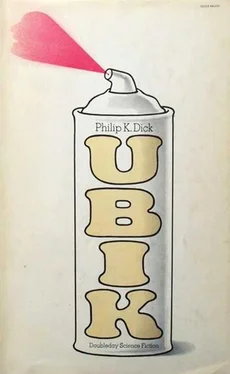“In a manner of speaking.”
“What do you foresee about the war in Europe?”
Joe said, “Germany and Japan will lose. The United States will get into it on December 7th, 1941.” He lapsed into silence then, not feeling inclined to discuss it; he had his own problems to occupy his attention.
“I’m a Shriner, myself,” Bliss said.
What is the rest of the group experiencing? Joe wondered. This reality? The United States of 1939? Or, when I rejoin them, will my regression be reversed, placing me at a later period? A good question. Because, collectively, they would have to find their way back fifty-three years, to the reasonable and proper form-constituents of contemporary, unregressed time. If the group as a whole had experienced the same amount of regression as he had, then his joining them would not help him or them—except in one regard: he might be spared the ordeal of undergoing further world decay. On the other hand, this reality of 1939 seemed fairly stable; in the last twenty-four hours it had managed to remain virtually constant. But, he reflected, that might be due to my drawing nearer to the group.
On the other hand, the 1939 jar of Ubik liver and kidney balm had reverted back an additional eighty-odd years: from spray can to jar to wooden-mold bottle within a few hours. Like the 1908 cage elevator which Al alone had seen—
But that wasn’t so. The short, fat, pilot, Sandy Jespersen, had also seen the wooden-mold bottle, the Elixir of Ubique, as it had become finally. This was not a private vision; it had, in fact, gotten him here to Des Moines. And the pilot had seen the reversion of the LaSalle as well. Something entirely different had overtaken Al, it would seem. At least, he hoped so. Prayed so.
Suppose, he reflected, we can’t reverse our regression; suppose we remain here the balance of our lives. Is that so bad? We can get used to nine-tube screen-grid highboy Philco radios, although they won’t really be necessary, inasmuch as the superheterodyne circuit has already been invented—although I haven’t as yet run across one. We can learn to drive American Austin motorcars selling for $445 —a sum that had popped into his mind seemingly at random but which, he intuited, was correct. Once we get jobs and earn money of this period, he said to himself, we won’t be traveling aboard antique Curtiss-Wright biplanes; after all, four years ago, in 1935, transpacific service by four-engine China clippers was inaugurated. The Ford trimotor is an eleven-year-old plane by now; to these people it’s a relic, and the biplane I came here on is—even to them—a museum piece. That LaSalle I had, before it reverted, was a considerable piece of machinery; I felt real satisfaction driving it.
“What about Russia?” Mr. Bliss was asking. “In the war, I mean. Do we wipe out those Reds? Can you see that far ahead?”
Joe said, “Russia will fight on the same side as the U.S.A.” And all the other objects and entities and artifacts of this world, he mulled. Medicine will be a major drawback; let’s see—just about now they should be using the sulfa drugs. It’s going to be serious for us when we become ill. And—dental work isn’t going to be much fun either; they’re still working with hot drills and novocaine. Fluoride toothpastes haven’t even come into being; that’s another twenty years in the future.
“On our side?” Bliss sputtered. “The Communists? That’s impossible; they’ve got that pact with the Nazis.”
“Germany will violate that pact,” Joe said. “Hitler will attack the Soviet Union in June 1941.”
“And wipe it out, I hope.”
Startled out of his preoccupations, Joe turned to look closely at Mr. Bliss driving his nine-year-old Willys-Knight.
Bliss said, “Those Communists are the real menace, not the Germans. Take the treatment of the Jews. You know who makes a lot out of that? Jews in this country, a lot of them not citizens but refugees living on public welfare. I think the Nazis certainly have been a little extreme in some of the things they’ve done to the Jews, but basically there’s been the Jewish question for a long time, and something, although maybe not so vile as those concentration camps, had to be done about it. We have a similar problem here in the United States, both with Jews and with the niggers. Eventually we’re going to have to do something about both.”
“I never actually heard the term ‘nigger’ used,” Joe said, and found himself appraising this era a little differently, all at once. I forgot about this, he realized.
“Lindbergh is the one who’s right about Germany,” Bliss said. “Have you ever listened to him speak? I don’t mean what the newspapers write it up like, but actually—” He slowed the car to a stop for a semaphore-style stop signal. “Take Senator Borah and Senator Nye. If it wasn’t for them, Roosevelt would be selling munitions to England and getting us into a war that’s not our war. Roosevelt is so darn interested in repealing the arms embargo clause of the neutrality bill; he wants us to get into the war. The American people aren’t going to support him. The American people aren’t interested in fighting England’s war or anybody else’s war.” The signal clanged and a green semaphore swung out. Bliss shifted into low gear and the Willys-Knight bumbled forward, melding with downtown Des Moines’ midday traffic.
“You’re not going to enjoy the next five years,” Joe said.
“Why not? The whole state of Iowa is behind me in what I believe. You know what I think about you employees of Mr. Runciter? From what you’ve said and from what those others said, what I overheard, I think you’re professional agitators.” Bliss glanced at Joe with uncowed bravado.
Joe said nothing; he watched the oldtime brick and wood and concrete buildings go by, the quaint cars—most of which appeared to be black—and wondered if he was the only one of the group who had been confronted by this particular aspect of the world of 1939. In New York, he told himself, it’ll be different; this is the Bible Belt, the isolationist Middle West. We won’t be living here; we’ll be on either the East Coast or the West.
But instinctively he sensed that a major problem for all of them had exposed itself just now. We know too much, he realized, to live comfortably in this time segment. If we had regressed twenty years, or thirty years, we could probably make the psychological transition; it might not be interesting to once more live through the Gemini spacewalks and the creaking first Apollo flights, but at least it would be possible. But at this point in time—
They’re still listening to ten-inch 78 records of “Two Black Crows.” And Joe Penner. And “Mert and Marge.” The Depression is still going on. In our time we maintain colonies on Mars, on Luna; we’re perfecting workable interstellar flight—these people have not been able to cope with the Dust Bowl of Oklahoma.
This is a world that lives in terms of William Jennings Bryan’s oratory; the Scopes “Monkey Trial” is a vivid reality here. He thought, There is no way we can adapt to their viewpoint, their moral, political, sociological environment. To them we’re professional agitators, more alien than the Nazis, probably even more of a menace than the Communist Party. We’re the most dangerous agitators that this time segment has yet had to deal with. Bliss is absolutely right.
“Where are you people from?” Bliss was asking. “Not from any part of the United States; am I correct?”
Joe said, “You’re correct. We’re from the North American Confederation.” From his pocket he brought forth a Runciter quarter, which he handed to Bliss. “Be my guest,” he said.
Читать дальше








